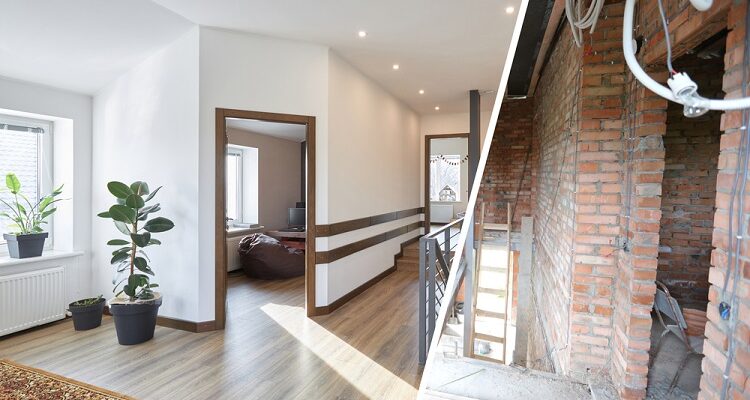Introduction
Are you looking to update your home but want to do it with an eco-friendly approach? You don’t have to compromise on aesthetics or quality while still using materials and products that are energy efficient, sustainable, recyclable and cause minimal environmental impact. From building materials such as cork flooring or bamboo cabinetry to solar panel installation, air conditioning and smart technology solutions, plenty of options are available to make your home more green without sacrificing the look or style you desire. If you’re considering a renovation project for your home and would like information on the best ecologically sound choices, read on for all the details!
Renovating your home with eco-friendly and sustainable ideas greatly reduces environmental impact and creates a healthier living space. Here are ten sustainable ideas for green home renovations:
1. Energy-Efficient Lighting:
Energy-efficient lighting is an essential element for eco-friendly home renovations. These lighting solutions utilize advanced technologies, such as LED bulbs and smart lighting systems, to significantly reduce energy consumption and improve overall sustainability. LED bulbs consume up to 80% less energy than traditional incandescent bulbs while lasting much longer, resulting in significant cost savings over time. Additionally, smart lighting systems provide personalized control options, such as dimming and scheduling, to optimize energy usage according to specific needs. Moreover, energy-efficient lighting reduces carbon emissions and lessens the environmental impact caused by excessive energy consumption. By incorporating these eco-friendly lighting options into home renovations, homeowners can contribute to a healthier planet and benefit from long-term savings on utility bills without compromising on quality or convenience.
2. Insulation:
Insulation is a crucial aspect of eco-friendly home renovations, as it plays an integral role in energy efficiency and reducing environmental impact. High-quality insulation materials, such as cellulose or recycled denim, provide excellent thermal resistance and effectively trap heat during winter while keeping the interior cool in the summer. This helps to minimize the use of heating and cooling systems, resulting in lower energy consumption and reduced carbon footprint. Additionally, proper insulation ensures consistent indoor temperatures throughout the year, eliminating cold spots and drafts that could compromise occupant comfort. Moreover, insulation reduces reliance on fossil fuel-based energy sources by preventing heat loss through walls, ceilings, and floors, contributing to a more sustainable future. In summary, prioritizing insulation during home renovations enhances thermal performance and promotes eco-friendly living by significantly reducing energy usage.
3. Solar Panels:
Solar panels are a highly beneficial and eco-friendly home renovation option for those looking to reduce their carbon footprint. These panels consist of photovoltaic cells that convert sunlight into electricity, making them an excellent renewable energy source. By installing solar panels, homeowners can significantly decrease their dependence on fossil fuels and contribute to a cleaner environment. Moreover, solar panels can help homeowners save money in the long run by reducing their monthly utility bills. Although the initial cost of purchasing and installing these panels may be substantial, the return on investment is also substantial due to lower energy expenses. Solar panels are designed to last several decades with minimal maintenance, making them a reliable and durable addition to any home. Overall, adopting solar power through the installation of solar panels is a forward-thinking approach towards sustainable living that simultaneously benefits both individuals and the planet alike.
4. Water-Efficient Fixtures:
In today’s world, where environmental issues are paramount, eco-friendly home renovations have gained significant importance. One such facet is the installation of water-efficient fixtures that contribute to a greener planet and help homeowners save money in the long term. Water-efficient fixtures encompass a range of products designed to reduce water consumption throughout the house, such as low-flow toilets, faucet aerators, and showerheads. By deploying these fixtures, households can significantly decrease their overall water usage without compromising on functionality or comfort. Moreover, installing them often provides an opportunity for additional savings through various government rebates and incentives designed to promote sustainable practices. Consequently, incorporating water-efficient fixtures in home renovations aligns with emerging sustainability trends and demonstrates a commitment to responsible resource management and cost-effectiveness. As professionals in the industry, we advocate for adopting eco-friendly solutions like water-efficient fixtures as effective ways to address global environmental concerns and individual financial considerations.
5. Recycled Building Materials:
Recycled building materials have gained significant popularity recently due to a growing demand for eco-friendly home renovations. These sustainable alternatives offer numerous benefits not only to the environment but also to homeowners. Using recycled materials reduces construction waste significantly, as unwanted items are repurposed and given a new lease on life. Additionally, using such materials helps minimize the extraction of new resources, ultimately conserving energy and lowering carbon emissions from their production. Moreover, recycled building materials often showcase unique characteristics and aesthetic appeal that cannot be replicated with brand-new products. From reclaimed wood flooring to salvaged bricks and metals, these materials add distinctive charm and individuality to any living space while reducing the overall ecological footprint of the project. Embracing recycled building materials enables homeowners to create sustainable homes without compromising on style or quality.
6. Efficient HVAC Systems:
Efficient HVAC systems have become increasingly important in the context of eco-friendly home renovations. These systems are pivotal in maintaining a comfortable indoor environment and contribute significantly to energy efficiency, reducing a house’s carbon footprint. With technological advancements, modern HVAC systems can efficiently cool or heat living spaces while consuming minimal energy. Features such as programmable thermostats, variable speed compressors, and zone control enable homeowners to optimize their energy usage and reduce wasted heat or cooling. Additionally, eco-conscious individuals can integrate smart HVAC technologies that leverage artificial intelligence for predictive temperature control, thus further maximizing energy efficiency. Investing in efficient HVAC systems benefits the environment and leads to substantial cost savings through lower energy bills. As such, incorporating these environmentally friendly solutions into home renovations displays a strong commitment to sustainability while enhancing overall comfort and well-being for residents.
7. Natural and Non-Toxic Materials:
Natural and non-toxic materials are becoming increasingly popular choices for eco-friendly home renovations. These materials offer numerous benefits, not only for the environment but also for the health and well-being of occupants. By opting for natural materials such as bamboo, reclaimed wood, or cork flooring, homeowners can minimize their carbon footprint as they are renewable and have a lower environmental impact than conventional options. These natural materials often contain fewer harmful chemicals, reducing indoor air pollution and creating a healthier living space. Non-toxic paints and finishes are another important component of eco-friendly renovations, as they eliminate the use of volatile organic compounds (VOCs), which can cause respiratory problems and contribute to air pollution. Incorporating natural and non-toxic materials into home renovations is an environmentally responsible choice to promote a safer and healthier living environment for current and future generations.
8. Rainwater Harvesting:
Rainwater harvesting is an eco-friendly home renovation approach that involves collecting, storing, and using rainwater for various purposes. This method offers numerous benefits to both homeowners and the environment. By capturing rainwater from rooftops or other surfaces, it can be stored in tanks or cisterns and used for activities such as irrigation, toilet flushing, laundry, and even drinking water if properly treated. Rainwater harvesting reduces dependency on traditional water sources like underground wells or municipal systems, ultimately conserving precious freshwater resources. Additionally, this practice helps mitigate stormwater runoff and curb soil erosion by reducing water flow into drains and water bodies. Furthermore, rainwater is free from chemicals like chlorine commonly found in tap water supply and is softer, making it ideal for plant’s healthy growth. Embracing rainwater harvesting as part of home renovations embraces sustainability while maximizing resource efficiency.
9. Energy-Efficient Appliances:
Energy-efficient appliances are essential components of eco-friendly home renovations. These appliances deliver substantial benefits, not only for the environment but also for homeowners’ wallets. Using advanced technologies and innovative designs, energy-efficient appliances significantly reduce energy consumption and minimize greenhouse gas emissions. They achieve this by optimizing power usage and incorporating smart features such as sensor-based controls and programmable settings. Energy-efficient refrigerators, for instance, use less electricity to keep food cold than older models, resulting in lower utility bills and reduced strain on power grids. In addition to their financial advantages, these appliances also play a crucial role in conserving precious natural resources. By choosing energy-efficient alternatives during renovations, homeowners can contribute to a greener planet while enjoying long-term savings on their energy expenses and carbon footprint.
10. Using Eco-friendly Paint:
Eco-friendly paint is a crucial component of eco-friendly home renovations. Conventional paints contain harmful volatile organic compounds (VOCs) that contribute to indoor air pollution and harm human health and the environment. In contrast, eco-friendly paints are formulated with natural ingredients and low levels of VOCs, making them non-toxic and sustainable options for homeowners. These paints prioritize health and safety without compromising performance or aesthetics. With technological advancements, eco-friendly paints come in various colours and finishes, catering to different design preferences.
Additionally, they provide excellent coverage and durability while minimizing waste, as they often require fewer coats than traditional paints. By choosing eco-friendly paint during home renovations, professionals can create healthier living spaces, reduce their carbon footprint, and contribute to a sustainable future. Brisbane Painters is here to help, offering expert skills and eco-friendly materials to make your renovation dreams a reality.
Remember, sustainable home renovations are a long-term investment that benefits the environment and your wallet. Choose ideas aligning with your budget, priorities, and local regulations to create greener, more efficient green living and space.
Conclusion
No matter how big or small you intend to go with your home renovation, incorporating eco-friendly options into your project is a great way to make a positive difference in this world and protect our planet for future generations. Not only does it make your home look beautiful and trendy, but it also helps ensure you reduce the risk of environmental disasters. Additionally, it can help lower energy costs while adding more financial value to your home. When done right, an environmentally conscious renovation can have helpful outcomes for the environment and your wallet too! If you are thinking about revamping or renovating your house, consider giving eco-friendly renovations some thought and see how amazing the results will be!
Autobiography
Jim Pulman has extensive knowledge and experience in Home Building, Construction, and Design. He writes articles in his free time and partners with content creators to share his expertise with the online community









Comments